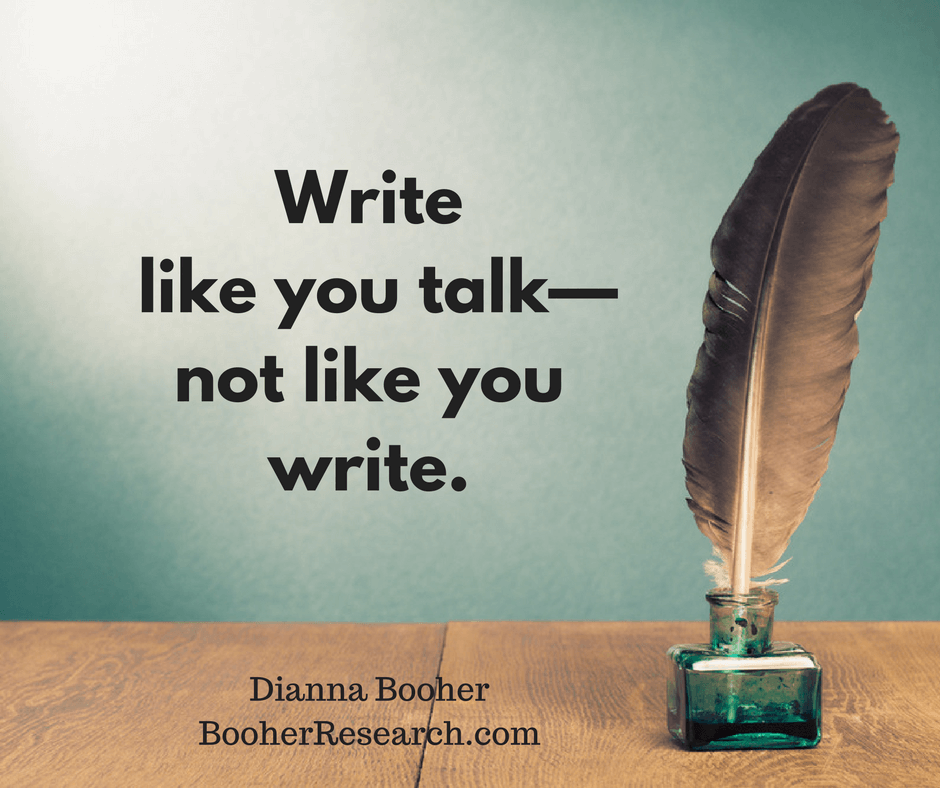


My blind friend Armand recognizes me and others in our circle by voice. He has no problem knowing who has joined the conversation once they speak because all our voices sound distinct.
Unfortunately, the same can’t be said of many of those white papers, website pages, and ebooks that you download for free. Many sound like they came from the same keyboard. They’re cluttered with the same clichés, jargon, and platitudes.
Frankly, that makes them boring. But tell writers they lack voice and they stare at you as if you’d just told them they’re missing all their front teeth.
You could count me in with the clueless about 20 years ago when I wrote my tenth business book, 10 Smart Moves for Women Who Want to Succeed in Love and Life. I sent off the first chapter to a new editor at a different publishing house. She called me. “Dianna, I like the content here—but there’s something missing. I think it’s voice.” For the first time in my writing life, I’d been assigned a do-over.
Good motivation to figure out how I had “disappeared” in writing that first chapter. So I did.
Basically, your voice means “your personality”—how your personality comes through in your writing. For that book, I’d interviewed and synthesized insights from 30 women. As a result, that first draft sounded more like a news report than a book. I got the editor’s drift and repaired the damage.
So how do you put personality into your writing. Let me count the ways:
Seriously. I’ve been stressing this point since teaching my first business writing workshop eons ago to a group of engineers at Shell Oil. The concept was foreign to them back then—although it’s fairly well accepted now even by technical writers.
But here’s how the workshop went down back then: At break, an engineer would say something to me in clear straightforward English like, “Our executive team hasn’t approved the decision to drill in that field yet.” But in their documents, they’d write things like this: “A decision has not been forthcoming from our executive management team about the feasibility of drilling in said field at this point in time.”
Clearly, these engineers had two voices—a writing voice and a talking voice. It took SOME persuasion to get them to use their talking voice to write.
You can do it too. Use plain English when you write—a casual conversational style, without the jargon and clichés. Then in the editing step, go back and cut the repetition and correct the grammatical errors. That draft will likely be good to go.
Don’t tell people everything you know. Comprehensive doesn’t equate to brilliant. Selection represents insight. Understand what people need to know or want to know and tell them that—nothing more and nothing less. They’re trusting you not to waste their time. So don’t.
Anybody can research stories on the internet to illustrate a point. Your emails, presentations, speeches, reports, and proposals engage because they reflect your unique experiences and insights. If I wanted Obama’s, Clinton’s, Trump’s stories, I’d go to YouTube or Google. Tell me what your Aunt Fannie always told you about lying, and I’ll listen and maybe learn something new.
Think like Hollywood. How would you get your point across to your 7-year-old? To your grandmother? To your running friends at the track? To your next-door neighbor? I’m guessing you’d change your delivery somewhat, add different illustrations, choose different words, and be more or less formal with each group.
My point: You have many ways up your proverbial sleeve to make the same point. So when you write that next email, proposal, white paper, marketing piece, or ebook, look at your options. Get creative.
With a colorful metaphor? Colorful description? Remind them of a song lyrics? Link it to a TV sitcom? Use a recent movie as your framework or analogy?
Go for it. What persona or voice do you want to create on your canvas?
––Don’t bury them. Not: “Please make a determination about the usefulness of these items in the upcoming meeting.” But: “Please determine if these items will be useful in the upcoming meeting.”
––Make them active. Passive: “An audit should be made of your plant before yearend.” Active: “Audit your plant before yearend.”
––Give them energy. Low impact: “This software is fast.” High impact: “This software expands our capacity by 600 percent.” “To be” verbs [is, are, was, were] sound weak.
Unlike speakers who may lose their voice permanently, with the five pointers above, writers can find their voice quickly and slip on just about any personality they choose.